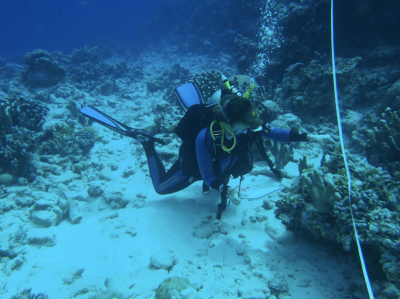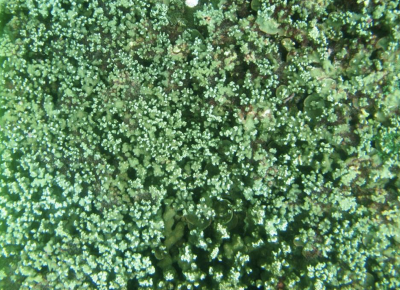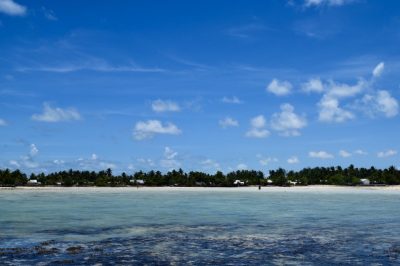A new UBC study on the impact of climate change on coral reefs is raising sticky questions about conservation.
It found coral in more polluted and high traffic water handled extreme heat events better than a more remote, untouched reef.
The new study, conducted with researchers from the Republic of Kiribati’s Ministry of Fisheries and Marine Resource Development, focused on two atolls in the Central Pacific, located 59 kilometers apart.
“Because of El Niño-Southern Oscillation, which causes ocean temperatures to fluctuate along the equator from year-to-year, these coral reefs experience heat stress more often than reefs in other parts of the world,” says the study’s lead author Sara Cannon, a PhD student at UBC’s Institute for the Oceans and Fisheries and the Department of Geography.

Undertaking field work ©Sara Cannon
They found while extreme heat from climate change caused bleaching among the less disturbed coral reefs near the atoll of Abaiang—leaving behind an underwater wasteland—the coral reefs near the more populated and polluted waters of Tarawa, the capital of Kiribati, adapted.
“Marine protected areas (MPAs) are the most common tool that scientists recommend to protect reefs from human-caused stressors, including climate change,” Cannon says. “But if MPAs create the conditions where more sensitive corals can thrive—by reducing local disturbances such as fishing or pollution, like in Abaiang—then it could backfire by making those reefs more vulnerable to heat stress.”
Tarawa’s reefs were dominated by a weedy species of coral, Porites rus, which flourishes in waters with high nutrient concentrations from pollution. They found Porites rus was “growing like dandelions” and could endure both pollution and high water temperatures.

Porites rus coral, which flourishes in Kiribati ©Sara Cannon
The results of the six-year-study on the reefs located in the island nation of the Republic of Kiribati raises “sticky questions” about how to move forward to protect coral reefs, notes Cannon.
“An important implication of this study is challenging common dogma in conservation biology, that places with less local threats to wildlife will be better able to resist climate-driven threats,” says Cannon.
“The reality is more complicated than that. Also, even if local stressors make reefs less vulnerable to climate change, we don’t want to imply that local threats are good for reefs, because we don’t fully understand the potential trade-offs—particularly for people in Kiribati.”
While the variety of coral growing in Tarawa may be able to survive extremes, Cannon notes, questions remain about its usefulness as fish habitat and its ability to prevent erosion. This is especially important for protecting low-lying atoll countries like Kiribati, vulnerable to rising sea levels. Also, it is unlikely that Tarawa’s reefs can ever be restored to their original, robust condition while the reefs on Abaiang could become healthy once again.
“We sometimes debate about whether it’s more important to support local restoration through projects like coral gardening or to address climate change to keep reefs healthy,” says Cannon. “But we need to do both.”

Tawara reef flat ©Sara Cannon
“People in the Pacific Islands contribute very little to climate change, yet they’re the ones paying the price of our actions in the global north,” says Cannon, who points out that in 2020, Canadians had one of the highest per capita emissions globally.
“For me that is one of the biggest takeaways, understanding what we can learn from this to support people there and also undo some of the harms we cause.”
The study “Coral reefs in the Gilbert Islands of Kiribati: resistance, resilience, and recovery after more than a decade of multiple stressors” was published today in PLOS One.
Tags: climate change, conservation, coral, faculty, IOF students, Marine protected areas, Pacific, Research, Simon Donner